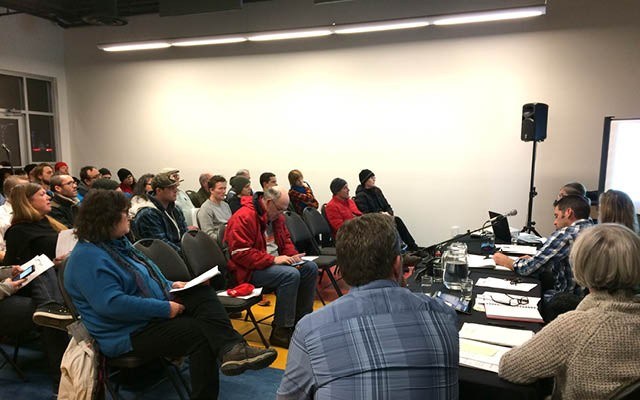It was standing room only on Tuesday, Jan. 31 as Village of Pemberton (VOP) council undertook a meeting to gauge public opinion and the course of action on a proposed zoning bylaw amendment to prohibit medical marijuana dispensaries.
Roughly 20 people addressed the proposed change — some of whom made emotional pleas to urge council to permit medical dispensaries in order to treat chronic pain or health ailments.
Danielle Lawson, from Mt. Currie, told the crowd of her car accident a few years ago that has left her with chronic pain and nausea.
"I tried everything else. I got a legal licence from Health Canada and received medicine from them — it's (of) a horrible quality," Lawson said, adding that she believes Health Canada irradiates the marijuana, and likened it to poison.
"I have to go to Vancouver and Squamish and I can't always get it, and then I'm sick," she told council, sobbing as she finished her address.
Council outlined the bylaw history, which began with the proprietor of SWED Society requesting in October an amendment in order to allow medical dispensaries in Pemberton.
SWED director of operations, Adam Blender, told the crowd and council that the company was the first to be granted a licence in Vancouver, which charges a $30,000 fee for the licence.
Blender said that waiting for the federal government to legalize medical dispensaries could delay people getting what they need.
"Not everyone has all the time in the world," Blender said. "It could be in December of 2017 by the time people have access."
Many people echoed Blender's observation that to rely on a federal government timeline would make patients unduly suffer.
Cori Golanowski, with the Cannabis Rights Coalition of Canada, told council that he works with cancer patients on a daily basis and getting access to marijuana is the top priority.
"A big part of our community is going to Squamish to get it. We're talking about people's lives," he said.
Squamish has allowed medical dispensaries, as Vancouver has and several other B.C. communities. Whistler has not.
Pemberton doctor Jim Fuller said he is very interested in giving patients access to medication to help them, particularly with something that aids cancer patients, but isn't convinced of the purported benefits for children with epilepsy, for example.
"I'm a little dubious," he said. "Sure, it clearly helps pain relief, I don't believe there's any evidence on the international stage (for epilepsy treatment). I'd be delighted if it was, but I just haven't seen any evidence."
And Kalmia Hockin, who has lived in Pemberton for five years, spoke of her legal licence for medical marijuana and how she receives the product via mail.
"(Health Canada has) cannabis through legal markets, it's not only through the stores. There are other resources out there. It is a simple as getting a certain amount of grams per month. It's completely legal that way," she said.
What Hockin said she does like about medical dispensaries is the basic knowledge about products and how to get a medical licence.
"I had a lot of trouble finding out how to apply," she said.
One option that came up numerous times was the possibility of approving a Temporary Use Permit (TUP), which could be granted by the VOP and which can be granted for any time period and can be renewed for up to three years. A TUP could be the solution and would not carry any grandfathering of current conditions, said VOP planner Lisa Pedrini. In other words, a TUP that sanctions a medical dispensary would not carry over indefinitely when federal government legislation comes into effect.
Local businessman David MacKenzie said he is torn over this issue, but welcomes free enterprise.
"I think it's a wonderful new investment but I caution council in moving forward with a bylaw that prohibits," he said. "Society is evolving, things are changing rapidly. I encourage council to reconsider. I can imagine the amount of staff time spent on this... Other jurisdictions have figured it out."
MacKenzie said the TUP could remedy this without worrying about any grandfathering issues that could come into play with bylaw changes.
Council also received via correspondence 15 letters, 11 of which were opposed to the bylaw amendment, and four in support.
Ginny Stratton, the SWED Pemberton manager presented a petition with 279 signatories with overwhelming comments that are in favour of a dispensary in the VOP.
"Currently, it's not working the way it is," she said, encouraging the VOP to fulfill the right of residents to be able to access a medical dispensary.
"Most viable is the TUP. We feel that would be another alternative to review ... before making changes at local level," and while changes at the federal level have yet to be confirmed.
Another concern was voiced by a resident of Elements, a strata property in Pemberton. Myson Effa, who owns a condo in the building that also has commercial space, said that if the medical dispensary were permitted in the building, residents could be compromised.
"We could lose our insurance," Effa told council. "You're threatening our life savings.
"We know marijuana is a great medicine. Soon the government will legalize it for recreational use and I think that's not compatible with residential stratas."
The decision on the bylaw now rests with council.




